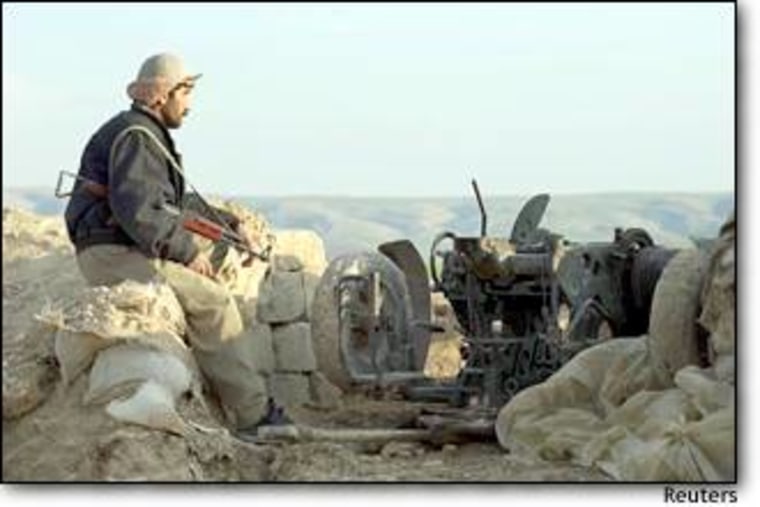In the muddy central bazaar of this front-line town, the men wait. Dressed in billowing pantaloons held up with colorful Kurdish tribal sashes, the men wait along the main road through town. They wait outside the handful of stores still open for business. Everywhere, they wait, in the hundreds, clutching their guns
Wartime Chamchamal, perched on the front line between Kurdish opposition orces and Saddam Hussein’s troops, is a man’s town. There are, it seems, no women left. Ninety percent of the population has fled, most of it women and children. They headed north, leaving the men of the family behind to protect their houses.
Once the American war comes to Chamchamal, and to the Iraqi army division based on the hill above the town, the Kurdish men will leave, too. But they will not be fleeing the American bombing. They will be heading toward it — to Kirkuk, the oil-rich city 20 miles west of here, to reclaim property taken from them by Saddam’s regime.
Some 90 percent of Chamchamal’s 58,000 residents are originally from Kirkuk, victims of Saddam’s campaign of “Arabization,” in which minority Kurds were forced out of their homes to make way for Arabs resettled in the traditionally Kurdish north on orders of the Iraqi leader.
The movement of perhaps thousands of well-armed Kurdish civilians toward strategically important Kirkuk could present a host of problems for invading American forces, which will aim to secure the city’s oil resources — crucial to Iraq’s post-war recovery — before Saddam can destroy them.
ARMED AND READY
With an aging Kalashnikov slung over one shoulder and four ammunition magazines strapped to his gut, Rozgar Salah hardly stands out in Chamchamal’s bazaar. The 25-year-old is among hundreds of similarly armed men carrying an arsenal of high-powered sniper rifles, Kalashnikovs and pistols. Some have hand grenades harnessed to their belts. They are all from the Kirkuk region.
“We are ready to fight the enemy, and Saddam is our enemy,” said Salah, who lost a half dozen relatives to Saddam’s security forces before the rest of the family fled to Chamchamal in 1988.
After spending years in exile, protected from Saddam by the U.S. and British “no-fly” zone over northern Iraq, Salah and other Kurdish victims of the Iraqi leader’s ethnic cleansing campaigns are readying to go home. For the some 120,000 Kurds expelled from Kirkuk, the start of the U.S. military campaign in Iraq signals their long-awaited return is tantalizingly close.
RUSH FOR KIRKUK
Under intense pressure from the United States, Kurdish officials say they will move to control the return of refugees to Kirkuk and to prevent ethnic bloodletting. Although a historically Kurdish city, Kirkuk his also home to Arabs, Turkomans, and Assyrians.
InsertArt(1835067)The Kurds have also promised Washington that their own anti-Saddam forces, estimated to number 50,000, will not inflame the situation by deploying into Kirkuk without an invitation from the Americans.
But it’s not clear whether Kurdish leaders can effectively manage the desires of thousands of armed civilians desperate to return to their homes after years of oppression under Saddam. Owning a weapon is nearly a birthright for Kurds, who have been killed by the tens of thousands by Saddam’s regime.
In Chamchamal’s market, emotions are already running high. The exiled men of Kirkuk say they are ready for a fight.
“This enemy has tortured us for decades,” said Kamel Khalaf, a 26-year-old whose family was forced from their home near Kirkuk in the 1990s. “We will go back soon,” he said, cradling his sniper rifle.
In the background, the quiet streets of Chamchamal were eerily punctuated by the thud of Iraqi mortars landing in the hills on the edge of town. The calibration tests suggested the Iraqi forces were preparing for battle.
Borkhan Omar, 26, said he hoped to return to Kirkuk without using the small arsenal he had strapped to his chest: spare magazines to go with his Kalashnikov, and three hand grenades.
“I don’t intend to shoot at anyone,” Omar said,” but if anyone shoots at me I will shoot to kill.”
(MSNBC.com’s Preston Mendenhall is on assignment in northern Iraq.)
